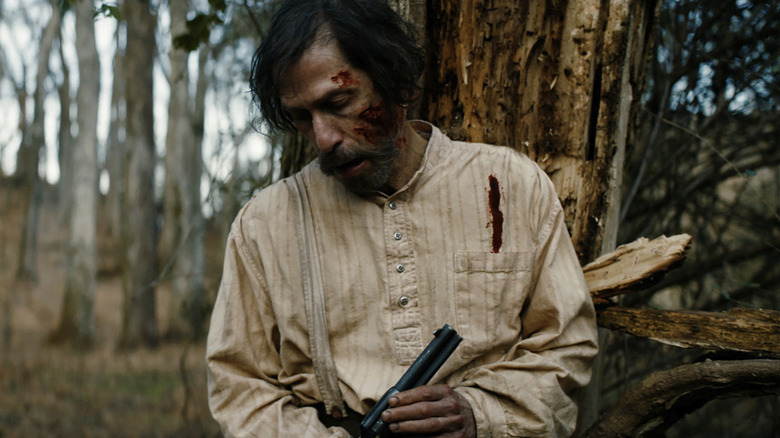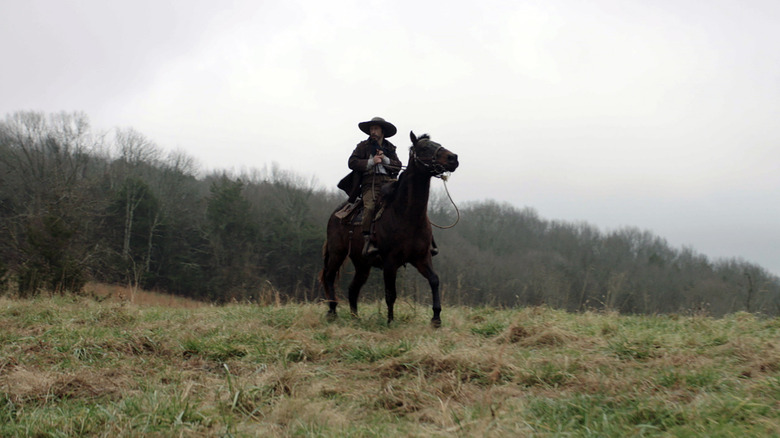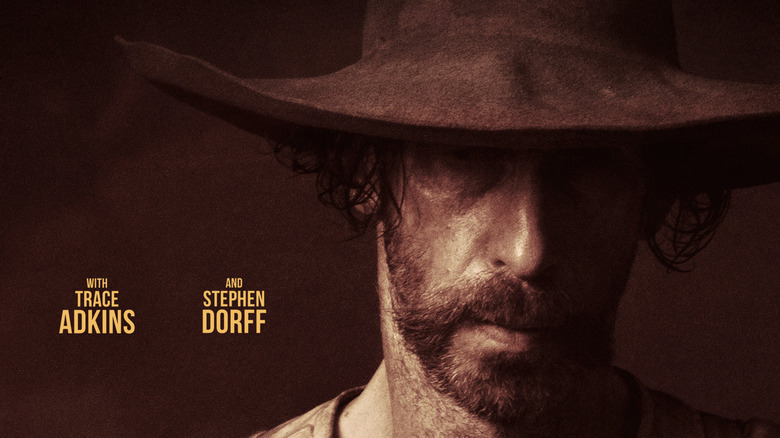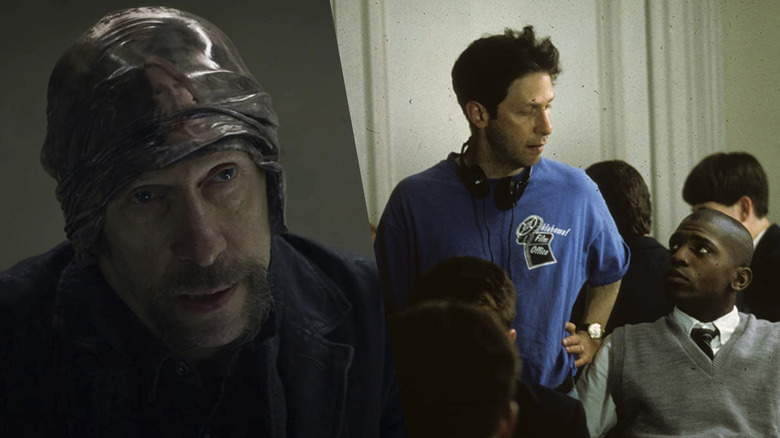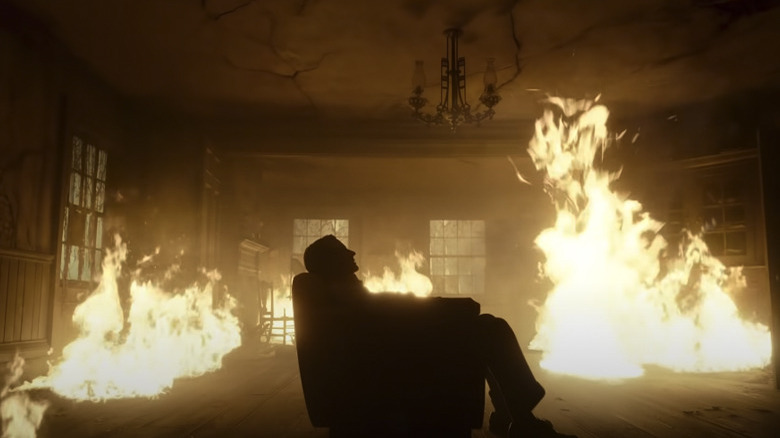Tim Blake Nelson On His New Western Old Henry, And Guillermo Del Toro's Nightmare Alley [Interview]
Tim Blake Nelson is a character actor through and through. You probably know him from his work in "O Brother, Where Art Thou?", "Holes," "The Incredible Hulk," and HBO's "Watchmen," in which he thrived playing supporting roles.
But sometimes, character actors are given the chance to step into the spotlight. He did it a few years ago in the Coen Brothers' "The Ballad of Buster Scruggs," and now he's back as the title character of "Old Henry," a new Western in which he plays a stoic father trying to keep his teenage son out of trouble. When they discover an injured man with a satchel full of cash, the father and son nurse the man back to health — but the whole thing turns into a siege when a trio of riders comes looking for the money. It's a small film, but don't let its size put you off — there's more here than initially meets the eye, and Nelson is particularly excellent playing a quiet family man who is harboring a dark past.
I had the chance to speak with him over Zoom about playing a lead role, working on Guillermo del Toro's upcoming "Nightmare Alley," that time he directed a teen-centric Shakespeare adaptation, and more.
I don't think I'll ever play a traditional leading man.
I've heard you speak fondly about being a character actor and the joys that come with not being the hero on screen. Did you miss that dynamic at all while you were making this movie?
No, because I looked at this as a character part. I don't think I'll ever play a traditional leading man. I think that every part I'll play will be — even if it's the lead in a movie, I look at it as a character role. And I'm delighted by that, and I feel especially blessed when the character role happens to be the lead role of a film. It's not essential for me, or I'd have no career. Because lead roles for character actors come along seldomly. But I never looked at this in any way where I thought, well, I'm a leading man here. This is a guy, he's a dad trying to raise his son as best he can, with a past that he's trying not only to hide, but to utterly repress. And because of an act of compassion, he fails to do so and tragic events ensue.
It also seems like there's something primal and elemental about a Western that is tough to put into words. There's such a rich cinematic legacy there. Did you feel any of that ineffable "Western magic" while making this movie?
I certainly did, and I think the Western is a quintessentially American form or genre because we're a young country that relied on the gun for westward expansion. For resources and land, we had to move west. We used the gun to accomplish that. Westerns also celebrate the iconoclast and the individual, and that, too, is essentially American. We prefer individual rights to rights of the collective. That's one of the big issues that separates us from the Europeans. And then finally, Westerns are movies. Originally they were books, but when we think of Westerns, we really think of movies, and that's something that America brought to the world. That's all inside of this genre. And then each generation gets to reinvent that genre and reflect itself through each new iteration of it. Being a part of that tradition, particularly as a kid who grew up in Oklahoma and watched Sergio Leone movies every weekend, is nothing short of an honor.
I sent Guillermo a picture, and he said, 'Can you trim it back?'
You were rocking an absolutely incredible mustache in "Old Henry." Tell me about how that decision was made.
You want the truth of the matter?
Sure, yeah.
So I knew I was going to play the part about a year out. So I decided, well, he's wanting to conceal himself. He's "old" Henry, so he's got some age on him. I'm going to grow a beard and let it grow for six months. So I did so. Right before I started growing it, I was supposed to do a role for Guillermo del Toro in "Nightmare Alley." And then Covid happened, so the movie got pushed indefinitely. Finally, they decided, "We're back up, and your dates are the end of October." And I knew that I was going to be shooting "Old Henry" and I had this monster beard. So I sent Guillermo a picture, and he said, "Can you trim it back?" I said, "Yeah." He said, "Great, then you can keep it." Then about three weeks later, he wrote and said, "You've gotta lose the beard." I can tell you why, but it would spoil "Nightmare Alley." So it was clear that I couldn't have a big bushy beard, just because of the part and people acting opposite me. So I lost the beard, and then when I got up there to shoot, he said, "You've gotta lose the mustache, too." I said, "Please, Guillermo," and we went back and forth, and finally he assented and said, "You know what? The mustache will actually be fine." I got to keep it and shape it in a way that would work for both movies, with scruff added. I did the part in "Nightmare Alley," and then I had three weeks before I needed to shoot "Old Henry," and I was able to grow scruff around it, and there we were.
Well, it worked out really well.
It did work out really well. In fact, I think it's better than if I'd had the beard.
I read the script for 'O,' because it was offered to me as a director, and I couldn't put it down.
I'd love to ask you about a few other projects of yours, if you don't mind. I really enjoyed your work in "Watchmen," which I thought was just an incredible piece of storytelling from top to bottom. Do you have any stories you can share from your time on that show?
All I can say is that working for Damon Lindelof is as thrilling as it gets. First and foremost because he's such an imaginative storyteller that you truly don't know where your character is headed, nor could you ever imagine where your character is going to be headed. That was really exciting week to week.
Just a few days ago, my colleague and I were talking about Shakespeare adaptations and reminiscing about that era of teen-centric films like Baz Luhrmann's "Romeo + Juliet," "10 Things I Hate About You," and the Othello adaptation "O," and I have to admit that I never realized that you directed "O." I was wondering if you had any recollections about making that movie.
Of course. That script came to me while I was working on "The Thin Red Line" in Australia as an actor. My wife was visiting me, and we both trained on Shakespeare at Juilliard, so we know most of the plays really, really well. This was in 1997. I abominated that they were making all of these high school Shakespeare adaptations, because I felt that inherently they were dumbing down the stories. Then I read the script for "O," because it was offered to me as a director, and I couldn't put it down. I thought to myself, damn, not only does this work, it's perfect. Because there have been all of these high school shootings, and where else but a high school – the cauldron of all the jealousy and gossip and hormonal extremes – where else would "Othello" fit better right now? It could be such an apt social commentary. So I said, "I'm going to join in this trend that I haven't much liked." And I made the film.
Guillermo is an eloquent social critic in his films.
You mentioned "Nightmare Alley." I just watched the 1947 version, and I'm curious if you can tell me about the tone of the del Toro adaptation? I know you can't say much, but the '47 film seems a little darker than some of the stuff that Guillermo has worked on recently.
Guillermo is an eloquent social critic in his films and he's deeply interested in the ramifications of fascism and the ramifications of social Darwinism and capitalism and where they intersect. "Nightmare Alley" is a profound meditation on the latter.
It's been a little while since you've directed anything. Do you have anything in development?
I don't know which one it's going to be, but I have a few scripts and it's just a question of which one will take off. I wrote a novel that I'm editing with an editor right now that's going to be published next year. And then I wrote a play about the life of Socrates that was done in the Public Theater just before the pandemic. So I took a little bit of a break from directing movies.
What's the novel about, if you don't mind me asking?
It is about Hollywood right as the pandemic is starting. I hope we can talk again when it's coming out. It'll be coming out in the winter of next year. It's a long process, writing a novel. I never knew. (laughs)
Well, thanks again for your time, and congratulations on "Old Henry." I really enjoyed it.
My pleasure, and I'm grateful for your interest in it. A little movie like this needs its supporters.
"Old Henry" opens in limited theaters on October 1, 2021.
